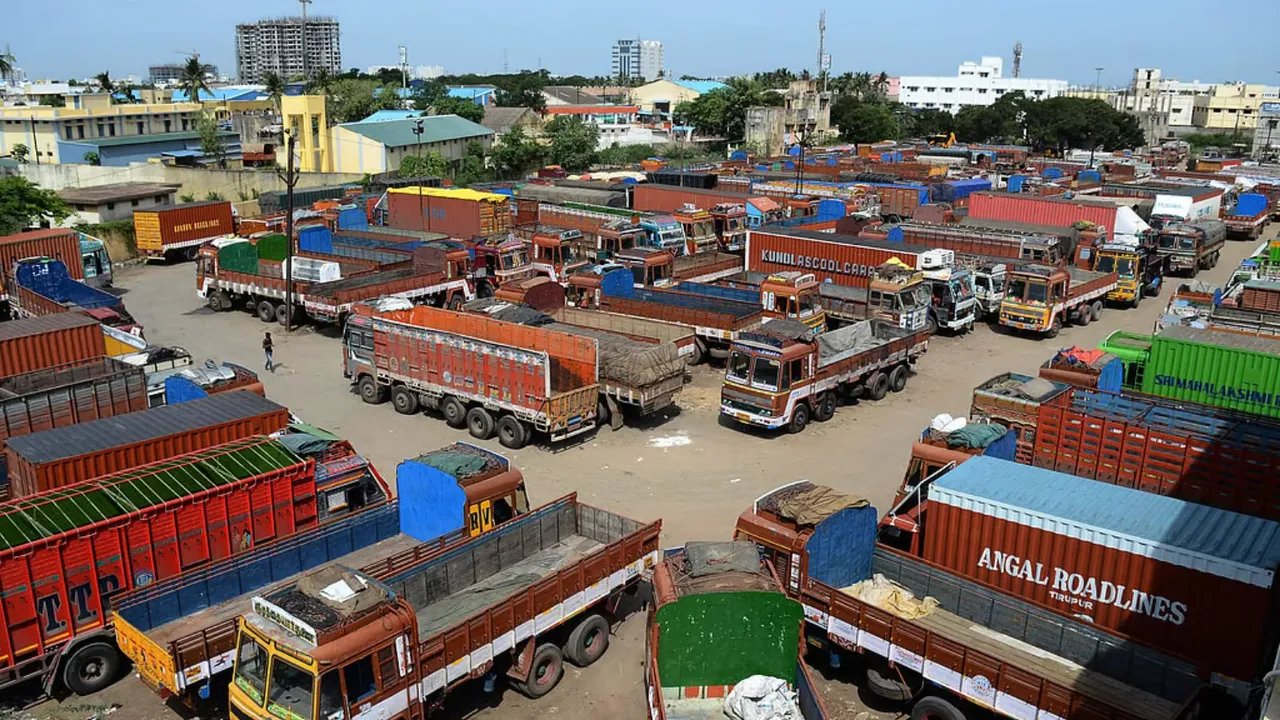Maharashtra’s transport sector witnessed early disruptions on Wednesday as thousands of truck operators launched an indefinite strike against what they describe as an aggressive and unfair implementation of the electronic challan system. The protest, called by a coalition of transport unions, is likely to affect goods movement and logistics operations across key commercial corridors of the state, including Mumbai, Pune, and Nagpur.
The action has been triggered by mounting concerns over the recovery process of e-challan fines, which transporters allege have become excessively punitive and are being enforced without due clarity or relief. Organisers of the strike claim that nearly 1.5 to 2 lakh commercial vehicles may remain off the roads in the coming days, unless the state administration provides urgent redressal. As of Wednesday morning, the response to the strike remained mixed. While hubs like Mumbai’s Kalbadevi reported a near-total halt in trucking operations, other regions saw partial participation as unions adopted a soft persuasion campaign to draw more members into the protest. The campaign has been dubbed a ‘Gandhigiri’ approach, focused on non-disruptive mobilisation through dialogue with vehicle owners and drivers.
The protest is being coordinated by an umbrella action committee of transport associations, which has raised a set of long-pending demands. At the heart of these grievances is the demand to stop coercive fine collection through e-challans, cancel penalty notices older than six months, waive existing fines, scrap the mandatory cleaner requirement for heavy vehicles, and revisit restrictive no-entry timings in metropolitan areas. Transport association representatives argue that the e-challan enforcement system has become opaque and overly rigid. Several members claim they are being penalised for alleged violations from over a year ago, which they say are difficult to verify or contest. Moreover, there is frustration over what they call “automatic compounding” of minor offences into high-value penalties.
In response to the mounting discontent, the Maharashtra government issued a Government Resolution late Tuesday night forming a 10-member committee. This panel includes senior officials from the state’s transport department, Mumbai traffic police, highway police, and representatives from the protest groups. The mandate of the committee is to evaluate the transporters’ demands and submit its report within one month. While the strike is expected to escalate in coming days, bus operators across the state have postponed their participation following an appeal from the state leadership. Officials reportedly requested passenger transport services to remain functional in the lead-up to the Ashadi Ekadashi pilgrimage, a significant religious event that sees large-scale travel by devotees.
State officials clarified that while the truckers’ demands are under active review, certain processes require legal vetting before policy action can be taken. The challenge, as described by insiders, lies in balancing the enforcement of traffic rules through technology with ensuring procedural fairness and commercial viability for logistics operators. The roots of the standoff trace back to a series of earlier protests, including a sit-in that was staged by truckers at Mumbai’s Azad Maidan in mid-June. The week-long protest was temporarily withdrawn after verbal assurances from government leaders, including a promise to set up a review committee. However, as no tangible relief was extended—particularly with respect to the demand for scrapping e-challans older than six months—transport unions went ahead with the planned strike in July.
Transport sector experts say the current impasse signals a deeper disconnect between enforcement-driven digital governance and ground-level realities. While the e-challan system was introduced to improve transparency and reduce manual intervention, it has drawn criticism for technical inaccuracies, delays in updating payments, and lack of accessible grievance redressal. Stakeholders point out that neighbouring states like Uttar Pradesh have offered waivers on old e-challan fines as a gesture of relief to transporters. This has further fuelled expectations within Maharashtra’s logistics community for a similar reprieve.
In addition to enforcement-related issues, truckers are also seeking relaxation in urban access timings. No-entry hours for goods carriers in cities like Mumbai and Pune have long been a sticking point, as they limit business hours and complicate delivery schedules, particularly for perishable and time-sensitive goods. Industry observers warn that if the strike gains further traction, the state’s supply chains could see significant disruption. Sectors such as construction, retail, food distribution, and manufacturing, all heavily dependent on intra-state trucking, may experience delays or price impacts.
With freight operators forming a key backbone of Maharashtra’s economy, political analysts believe that prolonged agitation could pressure the state government to explore interim measures, such as a temporary freeze on e-challan enforcement or a phased waiver scheme for past penalties. For now, the government has urged dialogue and patience. Officials insist the newly formed committee will examine the demands in detail, and fair solutions will be proposed. However, protest organisers remain sceptical, reiterating that the strike will continue until a concrete rollback or relief measure is announced—particularly with regard to the cancellation of old fines.
As the standoff continues to unfold, the situation remains fluid. While essential services have not yet been significantly hit, the coming days are likely to test the resilience of urban supply systems and the government’s ability to negotiate an equitable resolution. This protest, while framed around e-challan enforcement, ultimately raises critical questions about how technology should be implemented in public systems that intersect with livelihoods. Balancing digital compliance with human-centric policy design remains a challenge that Maharashtra—and indeed much of India—must navigate with care.
Also Read : Delhi Artificial Rain Project Delayed to August End


